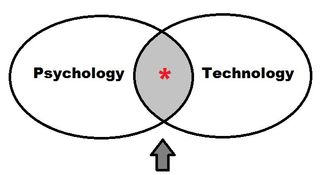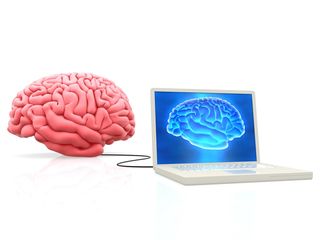Memory
Brave New World or Robot Apocalypse?
Will technology evolve us into better humans?
Posted April 26, 2019

What is the Psychology Through Technology blog about? To explain the scope of this blog, let’s look at this Venn Diagram showing two distinct areas of our lives: psychology and technology.
Psychology involves the scientific study of behavior and mental abilities. Psychology studies how and why behavior changes over time, and how behavior is affected by social connections and external events. Psychology is interested in how we learn and adapt, and develop our unique personalities, aptitudes, and attitudes. Of course, psychology also encompasses the diagnosis and treatment of a variety of mental disorders and other difficult life challenges. Psychology is for those interested in the mind, and how it interacts with your body and the people around you.
Technology is about applying science for practical purposes. Advances in machinery and computers are all good examples of what we think of as “technology.” This branch of knowledge usually deals with industry, machinery, and appliances—in other words, technology involves any practical application of science and engineering.
The technology bubble includes many forms of applied science, from biopharmaceuticals to transportation to cellular communications. Therefore, technology impacts and influences human behavior in many ways. Our minds invent new technologies, and our behavior is affected by our interactions with our meds and machines.
As the previous Psychology through Technology blog post explained (see: The Brain-Computer Interface Is Coming), scientists and engineers are working on a neuroelectric brain-computer interface. This is being tested to allow paralyzed patients to control robotic devices, or to serve as a data storage prosthesis for those with memory loss. The day is fast approaching when humans will directly connect with technology.
For good or bad, some of us will someday have cybernetic parts directly connected to our nervous systems. This idea of a human-computer interface is no longer science fiction. From cochlear implants to electrical brain stimulation, the boundaries between mind, body, and technology are blurred. Cyber-humans are becoming a scientific fact. The question is: How do we exploit the benefits of this technology “evolution” without falling prey to the pitfalls that science fiction writers have warned us about for decades?
The science fiction genre is filled with tales of human-computer interactions gone wrong. From Isaac Asimov’s "I Robot" to the dark world of William Gibson’s “Neuromancer”—and let’s not forget the global domination by AI technology depicted in “The Terminator” or “the Matrix.” These stories of technology gone awry are now an integral part of our folklore and culture. No wonder I receive emails (IN ALL CAPS) suggesting this blog is “OPENING PANDORA’S BOX!” As if reporting on tech somehow encourages the already exponential advance of technology throughout society.
This blog will not succumb to a “chicken little” mentality that warns of an inevitable downfall from too much interaction with technology. Currently, the benefits appear to outweigh the risks. But Internet addiction and over-use of cell phones is a real problem—we must stay alert so we don't become over-reliant on our tech toys. In other blog posts, I've shown how a “mental technology,” such as the Password method, can apply psychology to your life in positive ways, without using technology. For example, since it’s best to interact with others face-to-face, we can use technology (our phones and Apps) to make a date to meet in person! “Psychology through Technology” means using technology to enhance our behavior, human interactions, health, and well-being.

Stay tuned to this blog for reports on the interface between Psychology and Technology. I’ll continue to provide new psychology-meets-technology information for your benefit and will also continue to warn against a misguided overuse of technology. We can monitor our evolution with technology, and let positive psychology guide us to a future that engages technology for good, but remains forewarned of its risks.
As the author of this blog, I do not advocate for the unrestricted expansion of human-technology interaction. I will not be a cheerleader for a brave new world of androids and cybernauts. However, given the rapid growth of technology and its impact on human productivity and quality of life, it is reasonable to predict the future. Examine what’s going on in corporate and government laboratories, and it's easy to see the writing on the wall. The human-computer interface, an artificial eye, ear—perhaps even a memory enhancement—is coming. Along with these wonderful inventions will also come profound ethical issues and behavioral changes that fall into that space in our Venn diagram (above) where technology intersects with psychology. This is where this blog explores, neither with a first-adopter enthusiasm, nor a Luddite like closedmindedness.
The future involves an ever-closer marriage between humans and technology. To coin a cliché: “Resistance is futile.” The wave of technology integration with the human body and behavior continues its exponential growth. We prefer to help you stay informed to sensibly ride this wave into the future, rather than being overwhelmed by the technical tsunami that's coming… like it or not.



